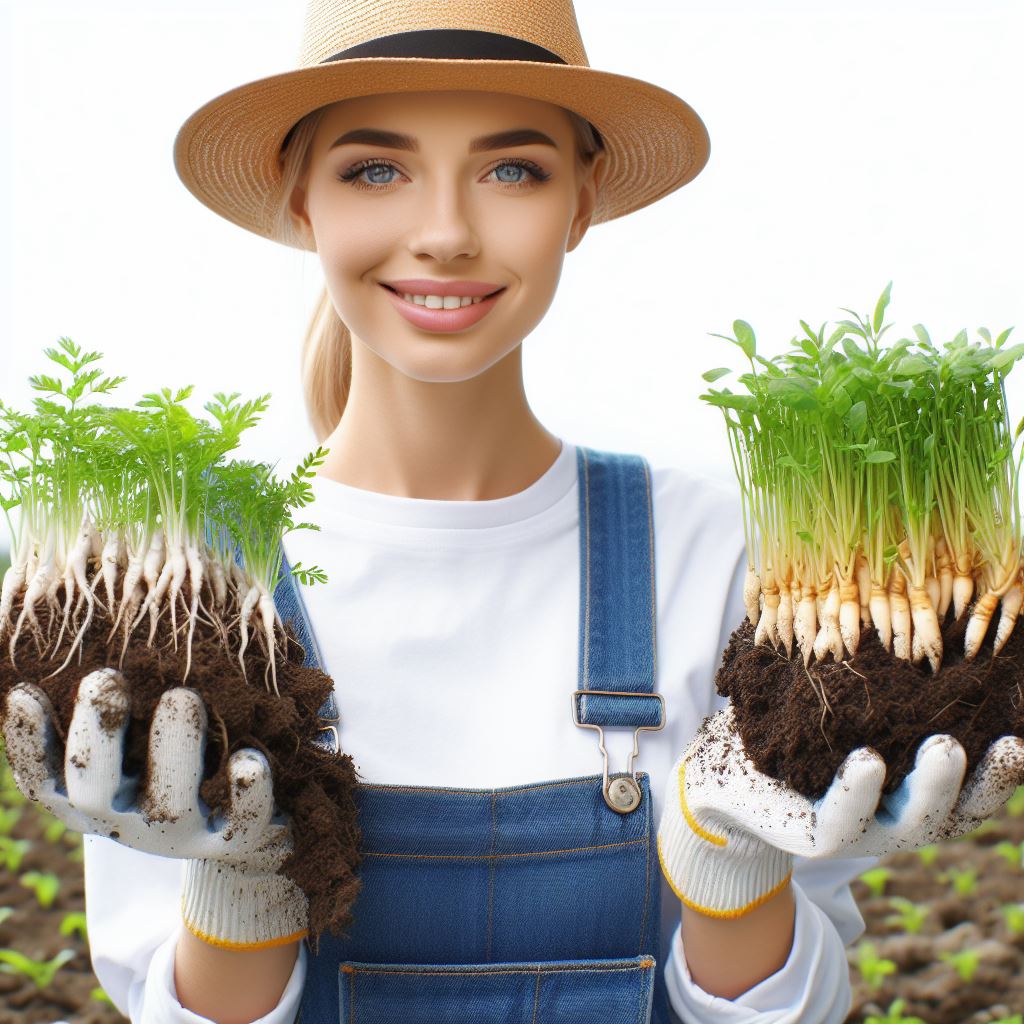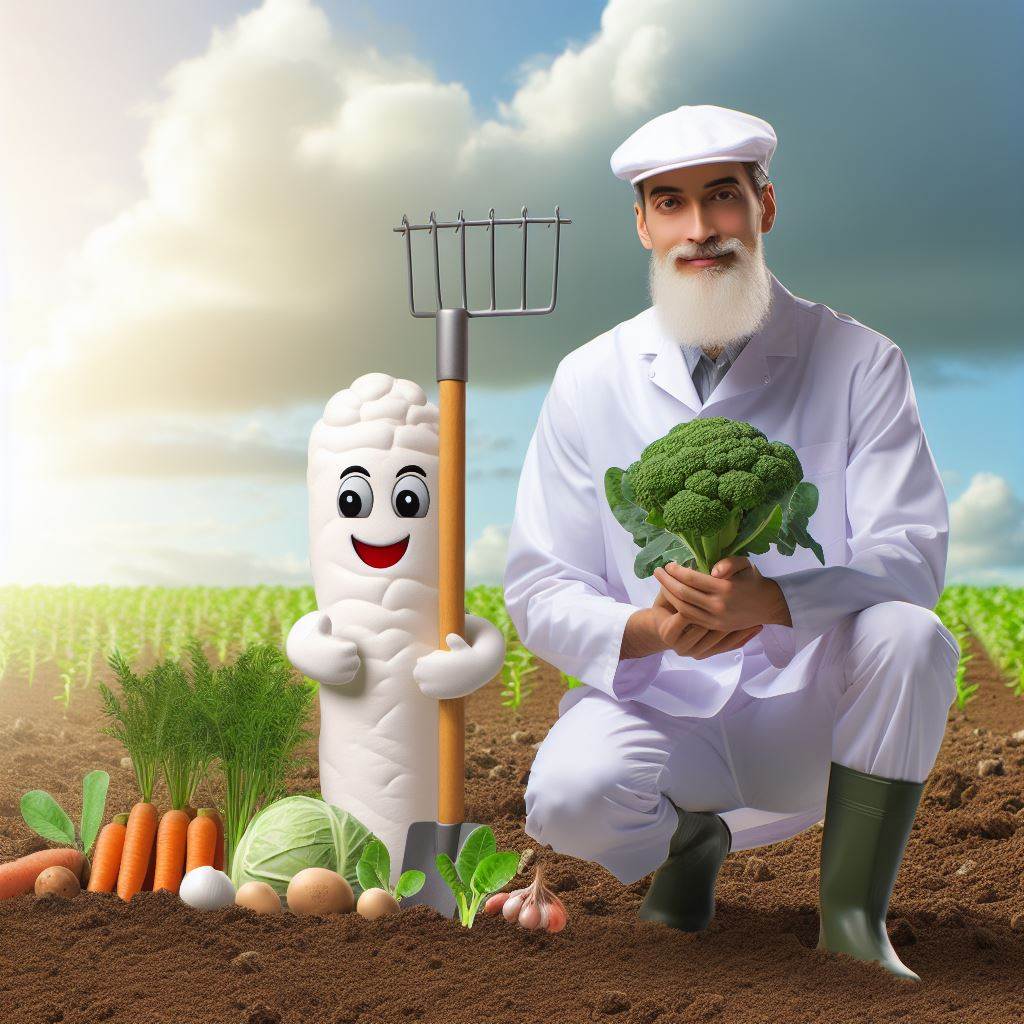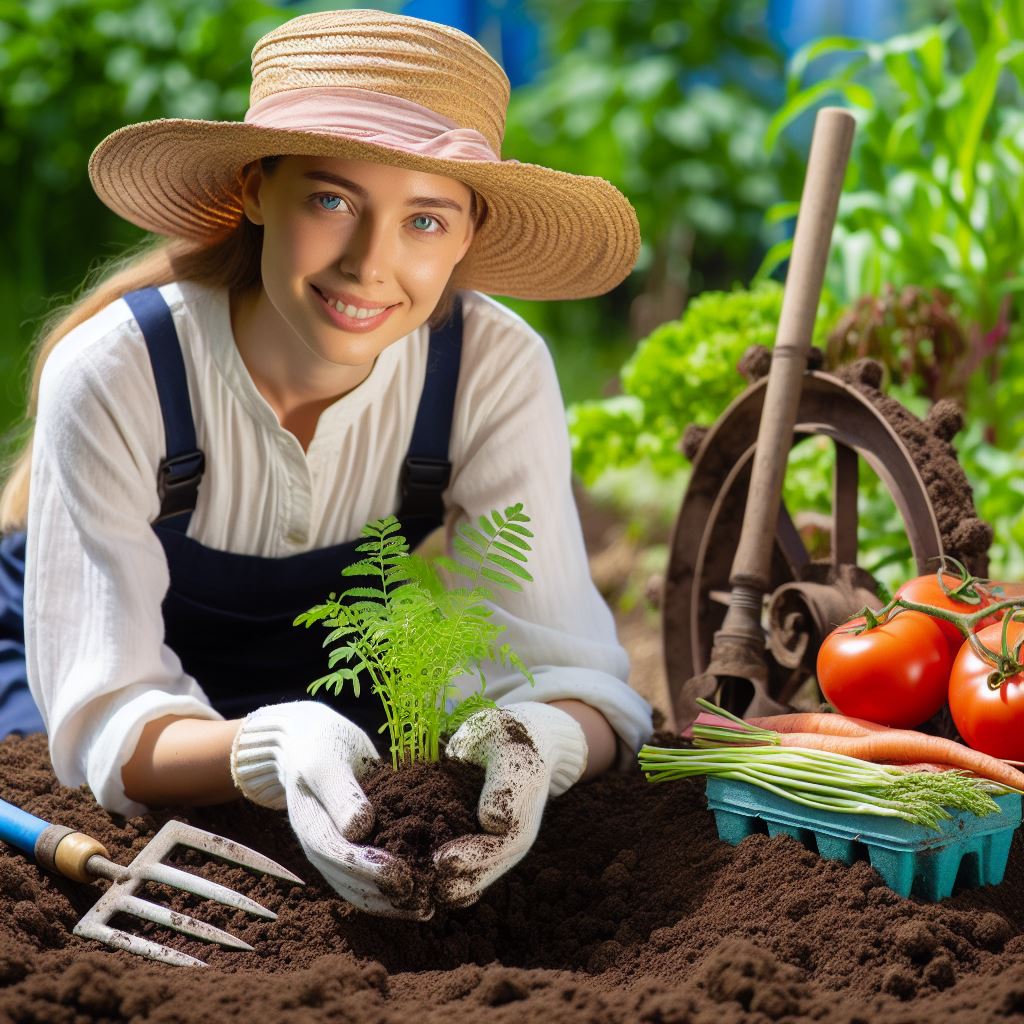Introduction
The purpose of this blog post is to provide essential guidelines for sustainable soil management through composting.
It emphasizes the importance of sustainable soil and the role of composting in achieving it.
Sustainable soil is crucial for maintaining healthy ecosystems and food production.
In this context, composting plays a vital role in enhancing soil fertility, mitigating waste, and reducing chemical inputs.
Composting Do’s:
- Select suitable organic waste materials like fruit/vegetable scraps, yard trimmings, and coffee grounds.
- Chop materials into smaller pieces for faster decomposition.
- Create a balanced ratio of carbon-rich (browns) and nitrogen-rich (greens) materials.
- Maintain moisture levels by regularly watering the compost pile.
- Regularly turn the compost pile to aerate it and promote decomposition.
Composting Don’ts:
- Avoid composting meat, bones, dairy products, and oily foods as they attract pests.
- Do not add diseased plants or weeds with mature seeds, as they can spread pathogens.
- Refrain from adding synthetic chemicals, treated wood, or non-biodegradable materials.
- Avoid adding excessive amounts of one material, as it may slow down decomposition.
- Do not let the compost pile become too wet or too dry, as it affects microbial activity.
By following these composting do’s and don’ts, individuals can contribute to sustainable soil management and create nutrient-rich compost for their gardens or agricultural practices.
It’s essential to be mindful and responsible composters to promote a healthier and more sustainable environment.
What is composting?
Definition of composting
Composting is a natural process that transforms organic materials into nutrient-rich humus, which can be used as a fertilizer for soil.
It is an environmentally friendly and sustainable method of waste management that helps reduce landfill waste and improve the health of soil.
Composting involves the decomposition of organic matter, such as food scraps, yard waste, and manure, by bacteria, fungi, and other microorganisms.
These organisms break down the materials, releasing carbon dioxide, water, and nutrients into the environment.
The organic matter used for composting should be a mix of “greens” and “browns”. Greens are nitrogen-rich materials like grass clippings, vegetable scraps, and coffee grounds.
Browns are carbon-rich materials such as dry leaves, twigs, and shredded paper.
The ideal compost pile should have a ratio of roughly three parts browns to one part greens.
Transform Your Agribusiness
Unlock your farm's potential with expert advice tailored to your needs. Get actionable steps that drive real results.
Get StartedHow it contributes to sustainable soil management
Composting contributes to sustainable soil management in several ways. Firstly, it enhances soil fertility by providing a rich source of nutrients.
The decomposed organic matter contains essential elements like nitrogen, phosphorus, and potassium, which are vital for plant growth.
Adding compost to soil improves its structure, water-holding capacity, and ability to retain nutrients.
Moreover, composting helps sequester carbon and reduce greenhouse gas emissions.
When organic materials are sent to landfills, they produce methane, a potent greenhouse gas.
Composting diverts these materials from landfills, reducing methane emissions and mitigating climate change.
Composting also promotes biodiversity in soil. The decomposed organic matter acts as a habitat for beneficial microorganisms like earthworms, beetles, and bacteria.
These organisms play a crucial role in breaking down organic matter, cycling nutrients, and improving soil aeration.
Increased soil biodiversity leads to healthier plants and a more resilient ecosystem.
By composting, gardeners and farmers can reduce the need for synthetic fertilizers and pesticides.
Healthy soil enriched with compost is better able to resist pests and diseases, reducing the reliance on chemical inputs.
This contributes to a more sustainable and environmentally friendly approach to agriculture.
To ensure successful composting, there are some important do’s and don’ts to keep in mind:
Do’s to ensure successful composting
- Use a compost bin or pile to contain the materials and facilitate the decomposition process.
- Stir or turn the compost regularly to provide oxygen for the microorganisms and promote even decomposition.
- Keep the compost pile moist but not waterlogged, as excessive moisture can hinder the decomposition process.
- Balance greens and browns to maintain the proper carbon-to-nitrogen ratio and speed up the decomposition process.
- Shred or chop large materials into smaller pieces to accelerate decomposition and prevent clumping.
Don’ts to ensure successful composting
- Add meat, dairy products, or oily foods to the compost pile, as they can attract pests and slow down decomposition.
- Include weed seeds or plants with persistent disease in the compost, as they may survive and re-infest the soil.
- Use treated wood or materials treated with pesticides in the compost pile, as they can contaminate the soil.
- Forget to cover the compost pile to prevent excess moisture, maintain heat, and deter pests.
In short, composting is an effective and sustainable method of managing organic waste and improving soil health.
It contributes to sustainable soil management by enhancing fertility, sequestering carbon, promoting biodiversity, and reducing the reliance on synthetic inputs.
By following the do’s and don’ts of composting, individuals can play their part in creating a healthier and more environmentally friendly world.
Read: Revitalize Your Soil: Organic Matter Secrets
The Do’s of Composting
Choosing the right materials
When composting, use these suitable materials:
- Fruit and vegetable scraps
- Coffee grounds and filters
- Yard trimmings (grass clippings, leaves, etc.)
- Eggshells
- Shredded newspaper or cardboard
- Manure from herbivores (horse, cow, rabbit, etc.)
Benefits of using organic waste for composting
- Nutrient-rich soil amendment.
- Reduces greenhouse gas emissions.
- Diverts waste from landfills.
- Improves soil structure and water retention.
Choosing the right materials is the first step. Utilize suitable materials, such as fruit and vegetable scraps, coffee grounds, yard trimmings, eggshells, and shredded newspaper or cardboard.
Organic waste provides numerous benefits as it enriches the soil, reduces greenhouse gas emissions, diverts waste from landfills, and improves soil structure.
Proper layering and mixing
Layering different materials is essential for successful composting.
Importance of layering different materials
- Provides a balance of carbon-rich (browns) and nitrogen-rich (greens) materials.
- Ensures proper airflow and moisture distribution.
Techniques for effective mixing
- Alternating layers of greens and browns.
- Shredding or cutting larger materials for faster decomposition.
- Incorporating smaller particles for better mixing.
Proper layering and mixing are essential for creating a balanced compost pile.
The layering technique combines carbon-rich browns and nitrogen-rich greens, ensuring proper airflow, and moisture distribution.
Alternating layers of greens and browns and shredding larger materials expedite decomposition and improve overall mixing.
Showcase Your Farming Business
Publish your professional farming services profile on our blog for a one-time fee of $200 and reach a dedicated audience of farmers and agribusiness owners.
Publish Your ProfileMaintaining moisture levels
Ideal moisture levels in compost piles
- Similar to a damp sponge – moist but not waterlogged.
- Optimum moisture range is 40-60%.
Tips for proper moisture management
- Water the pile during dry periods or if it gets too dry.
- Cover the pile during heavy rain to avoid waterlogging.
- Use a compost thermometer to monitor moisture content.
Adequate moisture levels are crucial for compost pile success.
Aim for a damp sponge-like moisture level, with an optimum range of 40-60%.
Water the pile during dry periods and cover it during heavy rain to maintain proper moisture levels.
Regular turning
Reasons for turning compost piles
- Promotes aeration and supplies oxygen to microorganisms.
- Helps break down materials faster and reduces odors.
- Ensures even decomposition and prevents hotspots or cold spots.
- Improves the overall quality of the compost.
How often to turn and methods for turning
- Turn the pile every 1-2 weeks with a pitchfork or shovel.
- Mix the outer materials into the center for uniform decomposition.
- Adjust the frequency based on the temperature, moisture, and size of the pile.
Composting is an excellent way to reduce waste and create nutrient-rich soil for gardening.
To ensure successful composting, it is crucial to follow the do’s of composting.
Regular turning is crucial for successful composting. Turning promotes aeration, supplying oxygen to microorganisms, which aids in breaking down materials faster and reducing odors.
Regular turning also ensures even decomposition, preventing hotspots or cold spots in the pile. Turning the compost every 1-2 weeks with a pitchfork or shovel is recommended.
Mixing the outer materials into the center helps achieve uniform decomposition. The frequency of turning can be adjusted based on the pile’s temperature, moisture content, and size.
By following the do’s of composting, individuals can create a sustainable and effective composting system.
Choosing suitable materials, properly layering and mixing, maintaining ideal moisture levels, and regular turning will result in nutrient-rich compost that positively impacts the soil and reduces waste.
Composting is an excellent way to contribute to a healthier planet and promote sustainable soil practices.
Read: Eco-Friendly Soil: Essential Nutrients Guide

The Don’ts of Composting
Avoiding harmful materials
List of materials to avoid composting
When it comes to composting, it is essential to be mindful of the materials you add to your compost pile.
Some materials can be harmful and should be avoided altogether.
The following is a list of materials you should never compost: plastic, glass, metal, treated wood, or any synthetic materials.
These items do not break down easily and can contaminate the compost.
Negative impact of adding inappropriate substances
Adding such inappropriate substances can have a significant negative impact on the composting process.
They can disrupt the balance of microorganisms in the pile and result in a slower decomposition rate.
Additionally, compost composed of these materials may not be suitable for use in gardens or farms, as they can introduce toxins into the soil.
Limiting certain foods
Foods that should not be composted
While composting is a great way to reduce food waste, not all foods are suitable for the compost pile.
It is best to avoid composting foods like meat, dairy products, oily foods, and cooked vegetables.
These items can attract pests, such as rodents or flies, and create unpleasant odors in the compost pile.
Reasons for avoiding certain items
Another reason for avoiding certain food items is that they take longer to decompose.
Composting is a process that relies on the breakdown of organic matter, and some foods can significantly slow down this process.
By limiting these foods in your compost pile, you can ensure a faster and more efficient decomposition process.
Controlling pests and odors
Pests and odors can be common issues when composting, but they can be managed with some preventive measures.
Tips for preventing pest infestations in compost piles
To prevent pest infestations in your compost pile, it is crucial to avoid placing meat, dairy, or oily foods in the pile.
Additionally, regularly turning and mixing the compost can help prevent pests from colonizing.
Keeping the pile moist but not too wet, and covering it with a breathable material, like a tarp, can also deter pests.
Techniques to minimize unpleasant odors
Unpleasant odors can be minimized by employing various techniques in your composting routine.
Mixing in dry materials, such as leaves or straw, can help absorb excess moisture and reduce odor.
Additionally, avoiding adding too much nitrogen-rich material, like fresh grass clippings, can help control odor levels.
Not neglecting the compost pile
Importance of regular monitoring
Once you have started composting, it is vital not to neglect your compost pile.
Regular monitoring is key to maintaining a healthy composting environment.
Regularly check the moisture levels of your compost pile. It should be damp, similar to a wrung-out sponge.
If it becomes too dry, add water, and if it becomes too wet, mix in some dry materials like leaves or straw.
Monitoring the temperature of the compost pile is also essential. A temperature between 120°F and 160°F indicates that the composting process is working correctly.
If the temperature is too low, consider adding more nitrogen-rich materials, like fresh grass clippings, to speed up decomposition.
Consequences of neglecting compost maintenance
Neglecting compost maintenance can result in a slower decomposition process and potential odor issues.
Without regular monitoring and adjustments, the compost pile may become stagnant or unbalanced, leading to a less effective composting process.
Showcase Your Farming Business
Publish your professional farming services profile on our blog for a one-time fee of $200 and reach a dedicated audience of farmers and agribusiness owners.
Publish Your ProfileIn essence, when it comes to composting, there are several important don’ts to keep in mind.
Avoiding harmful materials like plastic and metal, limiting certain foods, controlling pests and odors, and not neglecting the compost pile are all crucial aspects of successful and sustainable composting.
By following these guidelines, you can create nutrient-rich compost that benefits both your garden and the environment.
So, let’s compost responsibly and make a positive impact on our soil and planet.
Read: Maximize Fertility: Smart Crop Rotation Methods
Discover More: Organic Farming: A Path to Sustainable Future
Troubleshooting Common Composting Issues
When composting, it’s not uncommon to encounter issues along the way.
However, with a few troubleshooting strategies up your sleeve, you’ll be able to overcome common problems and maintain a successful composting system.
In this section, we will discuss three common composting issues and their respective solutions.
Compost not decomposing
If you find that your compost pile is not decomposing as quickly as expected, there are a few possible reasons for this slow decomposition.
One common culprit is insufficient moisture in the pile. Compost microbes need moisture to thrive and break down organic matter effectively.
Another reason could be a lack of nitrogen in the pile. Nitrogen is a key component for microbial activity, and without enough of it, decomposition slows down.
Lastly, improper layering can inhibit breakdown, as well. To promote decomposition in your compost pile, ensure that it is adequately moist by adding water if needed.
Additionally, incorporate nitrogen-rich materials such as grass clippings or kitchen scraps, and make sure to layer your compost properly, alternating between carbon-rich (e.g., leaves, wood chips) and nitrogen-rich materials.
Foul smell from compost pile
If you detect a foul smell emanating from your compost pile, there are a few causes to consider.
One common cause is the presence of anaerobic conditions. When compost lacks oxygen, it produces unpleasant odors.
Excess moisture can also lead to foul smells since it creates anaerobic pockets in the pile.
Other factors that contribute to odor issues include the inclusion of meat or dairy products, which can rot and produce strong odors.
To tackle these odor issues, it’s essential to turn the compost regularly.
This process introduces oxygen and helps create aerobic conditions, minimizing the production of unpleasant smells.
Adding dry materials like straw or shredded paper will also help absorb excess moisture.
Lastly, avoid adding meat or dairy products to your compost pile, as these can quickly become a breeding ground for odor-causing bacteria.
Attracting unwanted pests
Compost piles can become magnets for unwanted pests, but there are ways to discourage their presence.
Flies, rodents, and ants are commonly attracted to compost piles that contain food scraps.
To deter these pests, it’s important to bury food scraps deep within the compost pile, away from the surface.
This minimizes their accessibility and attractiveness to pests. Another strategy is to cover the compost pile with a tarp or a layer of straw or leaves.
This creates a barrier that makes it harder for pests to access the pile.
Additionally, avoid adding oils or fats to your compost, as these can attract pests and disrupt the composting process.
By troubleshooting common composting issues, you can overcome challenges and create a successful composting system.
Whether it’s addressing slow decomposition, tackling foul smells, or discouraging pests, these strategies will help you maintain a healthy and productive compost pile.
Remember, the key is to maintain the right balance of moisture, nutrients, and aeration to foster the decomposition process effectively.
Read: Boosting Soil Health: Top Cover Cropping Tips
Conclusion
To wrap up, it is important to recap the key points covered in this blog post on sustainable soil and composting do’s and don’ts.
Composting is a valuable practice that promotes the health of our soil and contributes to a more sustainable environment.
Firstly, we discussed the do’s of composting, which included using a mix of green and brown materials, maintaining the right moisture level, and turning the pile regularly.
These practices help facilitate the breakdown of organic matter and promote the activity of beneficial microorganisms.
On the other hand, we also highlighted the don’ts of composting.
These include avoiding the use of meat, dairy, and oily materials, as they can attract pests and cause odor issues.
Additionally, it is important to refrain from adding weeds or diseased plants to the compost pile, as they may spread pathogens or weed seeds.
Implementing sustainable composting practices is highly encouraged for anyone looking to improve soil health and reduce waste.
Showcase Your Farming Business
Publish your professional farming services profile on our blog for a one-time fee of $200 and reach a dedicated audience of farmers and agribusiness owners.
Publish Your ProfileComposting not only creates nutrient-rich soil amendments but also reduces the need for chemical fertilizers and reduces waste sent to landfills.
By following the recommended do’s and avoiding the don’ts, individuals can contribute to the long-term sustainability of their gardens and the environment.
So, let’s take action and start composting today to make a positive impact on our soil and our planet.




